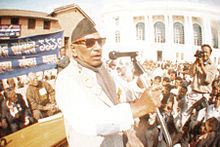Loading AI tools
Nepali politician (1915–1997) From Wikipedia, the free encyclopedia
Ganesh Man Singh (Nepali: गणेशमान सिंह; November 9, 1915 – September 18, 1997) was the leader of the democratic movement of 1990 in Nepal.[1] He is revered as the Father of Democracy and the Iron-man of Nepali politics.[2] He joined Praja Parishad to protest against the autocratic rule of the Ranas.
This article contains wording that promotes the subject in a subjective manner without imparting real information. (July 2015) |
Ganesh Man Singh | |
|---|---|
गणेशमान सिंह | |
 Singh in 1993 | |
| Born | November 9, 1915 Itumbahal, Kathmandu, Nepal |
| Died | September 18, 1997 (aged 81) Chaksibari, Kathmandu, Nepal |
| Organization(s) | Nepali Congress, Nepal Praja Parishad |
| Movement | Nepalese Democratic Movement |
| Spouse | Mangala Devi Singh |
| Awards | Nepal Ratna (2010) |

Ganesh Man Singh was born on November 9, 1915,[3] in Itum Bahal, Kathmandu. His father was Gyan Man Singh and his mother was Sanunani Shrestha Singh. His father died when he was young, so his grandfather, Ratna Man Singh (who was Badakaji in the Rana regime), raised him.
He studied in Durbar High School till class 6 when he was rusticated from the school for not respecting his fellow Rana students.[4] He then went to Calcutta to study where he completed his matriculation from Vidyasagar College in the first division.[4] He studied until ISc (Intermediate of Science) then returned to Nepal in 1938. [citation needed]


Ganesh Man Singh was one of the main leaders of the Nepali Congress Movement in 2007 B.S., which was able to overthrow the Rana Regime. In 2015 B.S., he was elected as a Member of Parliament from Kathmandu and later became a Cabinet Minister. After the coup d'état by King Mahendra, Singh became one of the main leaders advocating for democracy in Nepal. He ultimately became the Supreme leader of Nepali Congress, the title he held throughout his life. [citation needed]
He ventured into politics formally by joining Praja Parisad, the first political party of Nepal. In 1997 B.S., three months after marrying Mangala Devi Singh, he was handed life imprisonment by the Ranas for resisting their autocratic rule. He escaped from the prison and continued his struggle against the Ranas under a pseudonym, Krishna Bahadur Pradhan.[5]

After the coup of 1960, Singh was held without trial for eight years at the Sundarijal Military Detention Camp.[6]
Recognizing his outstanding contribution in the field of Human Rights, Mr. Singh was honored by the United Nations with the “Human Rights Award” in 1993. He is the first Statesman from South Asia to receive this prestigious award.[citation needed]
Singh received the “United States Peace Run Prize” in 1990 for his contribution to peace in Nepal and the world and his leadership quality. He was also decorated by the “U Thant Peace Award”.[citation needed]
Ganesh Man Singh Foundation was established in the commemoration of Ganesh Man Singh with the presidency of his son Prakash Man Singh.[7]
Singh made major contributions to Nepal. He was the leader of the anti-Rana Movement in 2007 B.S. as well as the leader of the Nepali Congress. He gave continuous efforts for the establishment of democracy over the autocratic rule of Ranas. He was the commander of the Mass Movement-I (2046 B.S.) Ganesh Man Singh's continued effort led to multi-party democracy's establishment in Nepal. He also showed his great renunciation by refusing the post of prime minister and instead suggesting the name of his friend Krishna Prasad Bhattarai for the post.
He died on 2 Ashwin 2054 B.S. at Kathmandu.
Seamless Wikipedia browsing. On steroids.
Every time you click a link to Wikipedia, Wiktionary or Wikiquote in your browser's search results, it will show the modern Wikiwand interface.
Wikiwand extension is a five stars, simple, with minimum permission required to keep your browsing private, safe and transparent.